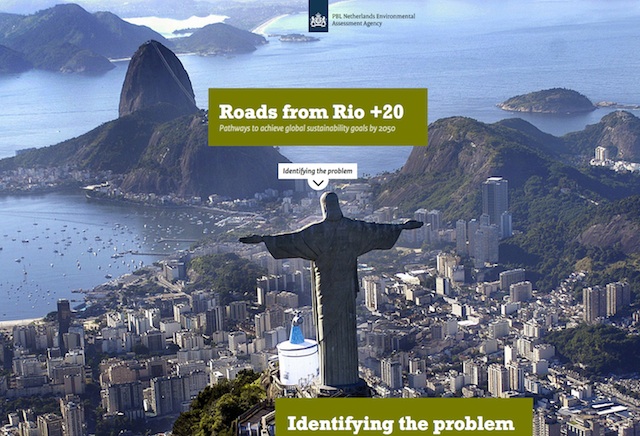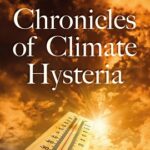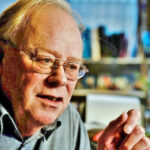
On a day with particularly interesting weather (tornado’s, hail, storm – see my picture), while surfing the web for my daily dose of news on climate and energy, I accidentally came across an online report by the Dutch Environmental Planning Agency (PBL) about tracking the goals of “Rio 1992”. There is a regular webversion here and a sexy any device app version here.
[youtube id=”b6aa2utj3Bc” width=”600″ height=”340″ position=”left”]
Furthermore there is the above 20 minute video where the whole story is told in a preachy tone.
It is concise and very readable while in a nutshell describing the challenges that lie ahead for achieving less than 2°C warming.
I was particularly triggered by the use of “decarbonization of the global economy”, which has to achieve levels (6% by 2030) of the global economy beyond anything ever seen since the 1980’s (0-2%), and which has been decelerating for some time now.
According to the PBL site, such levels of decarbonization can at the moment only be achieved via a variety of measures and pathways, a.o. avoid deforestation, decrease GHG emissions, increase nuclear energy, increase bio-energy, increase solar + wind, increase CO2 capture and sequestration and improve energy efficiency.
This reminded me of the works of likes of Roger Pielke jr., Richard Tol and Vaclav Smil (but there are many others).
Since I recently looked at simple measures to translate CO2 emission reductions into avoided warming, I thought it was worthwhile to summarize the essence of the “avoid global warming” movement as can be derived from the PBL site in the light of the scholars mentioned above.
So, to achieve less than 2°C warming, the global economy would have to:
(1) Reduce prosperity and growth in particular in the developed First World and change lifestyles
(2) Without actually denying the poorest some form of basic access to affordable energy
(3) Improve the food availability for the poorest
(4) While still allowing the global population to grow
For this, the following measures are proposed that go against current developments:
(5) Expand the use of nuclear energy
(6) Get people to eat less meat
(7) (Immediately) Reduce the use of coal
(8) Turn around the current deceleration in decarbonization of the global economy
With the use of the following targets that appear difficult and even unlikely to be achieved, given current understanding and/or trends
(9) Using more biofuels without affecting global food production
(10) Increase global food production by 60-70% in 2050
(11) Reduce expanding infrastructure, like cities and roads
(12) Avoid affecting biodiversity
(13) Expand environmentally protected areas
(14) increase solar + wind (now ~ 0.3% of global total energy production) 10 to 100 fold (and more) …
(15) while still being able to produce that amount of energy when the wind is not blowing and sun is not shining
And definitely relying on some “Magical Solutions”, i.e. policies, measures and developments that either never have been achieved (decarbonization, energy efficiency), are highly unlikely to be achieved (Carbon Capture and Sequestration) and/or based on current experience, turn out to be highly unrealistic to almost impossible (electrification of transport, use of hydrogen).
(16) Get decarbonization to levels never seen before
(17) Get Carbon Capture and Sequestration to levels never seen before
(18) Reach energy efficiency gains at levels never seen before
(19) Get electrification (e.g. cars) to levels never seen before
(20) Get the use of hydrogen to levels never seen before
This is The Challenge, and I hardly ever see those wanting to achieve this – be it politicians, policy makers, lobbyists or lay people – even having the slightest comprehension of what they actually are trying to achieve.
Which doesn’t mean that they don’t try to achieve these goals nevertheless. They appear to think that if we really believe very hard that we can do this, then we actually can (easily) do this. It reminded me of this phrase from the song by Queen (“I want it all”):
People do you hear me just give me the sign
It ain’t much I’m asking if you want the truth
Here’s to the future for the dreams of youth
I want it all, I want it all, I want it all, and I want it now !!!
Disclaimer: I realize that this list may be far from complete, and this is my personal reading and interpretation of the PBL information. One might beg to differ, but I feel confident and supported by many scholars, some of them cited above.






Het rapport van het PBL zou als verplichte bijsluiter moeten hebben: “Gebaseerd op de bevindingen van het IPCC”.
Het valt nauwelijks op, maar goedgefinancierde klimaatwetenschappers presteren het om na 4 jaar intensieve studie en onderzoek de onzekerheid op basis van scenario’s te vergroten van (2,0-4,5) naar (1,5-4,5).
Let wel, een scenario is geen voorspelling maar de uitkomst van computermodellen.
Mix die met economische scenario’s en je hebt grote kans op virtuele doemscenario’s.
Die moet je negeren.
Bij de puntjes 5 t/m 8 moet ‘Spitzenreiter’ Duitsland zich toch even achter de oren krabben.
Laaif is to sjort om het hele verhaal van Haaiert te beluisteren; zeker als hij begint met “F*ck kosten – baten”.
Dan kan ik werkelijk leukere dingen bedenken zoals b.v. herlezen van ‘Nooit meer slapen’ waarin Hermans ons al subtiel wijst op de kracht van ECHTE technologische vooruitgang en vooruitgang in kennis.
Bij een bezoek aan het Geologisk Unersokelse in Trondheim laat hij professor Oftedahl zeggen:
“Zonder de geofysica zouden de olie- en aardgasvoorraden al lang zijn uitgeput. Of, om het eenvoudig te houden, wat een ommekeer hebben de luchtfoto’s niet gebracht in de kennis van de aarde!”
Dat inzicht lijkt me duizend maal meer waard dan het Marxistisch geïnspireerde gebabbel van onze PBL-directeur.
(10) Increase global food production by 60-70% in 2050
(16) Get decarbonization to levels never seen before
eh….
“using more biofuels…”
is achterlijk in historische context.
Ontbossing was -het- probleem sinds de ijzertijd. Fossiele brandstoffen hebben het bos gered.
Het rendement waarmee zonlicht biomassa produceert ligt beneden de 1%.
Alleen primitieve volkeren stoken biomassa: hout en gedroogde poep.
Ziekten en plagen zorgen voor evenwicht met de natuur.
Vroeger was alles beter: https://nl.wikipedia.org/wiki/Lijst_van_natuurrampen_in_België_en_Nederland
Onze eigen geschiedenis laat zien hoe onvoorstelbaar infantiel onze huidige beleidsmakers werkelijk zijn.
Nog zo’n punt; de gehele voedselvoorziening biologische en duurzaam maken, met behoud/verhoging van de efficiëntie, hygiëne, voedselopbrengsten. Zonder verhoging van de prijzen, landgebruik, verlies aan kwaliteit.
Eigenlijk heel logisch…
Karel de Grote voerde de verbeterde biologisch landbouw, met het drieslagstelsel. Windmolens zijn uitgevonden in China 2000 jaar terug, via Perzië naar Europa.
De klimaat & milieu religie denkt dat deze beide de redding voor de mensheid impliceren. :-). Hoe simpel kan je denken!
http://nl.wikipedia.org/wiki/Drieslagstelsel
http://nl.wikipedia.org/wiki/Windmolen#Oorsprong